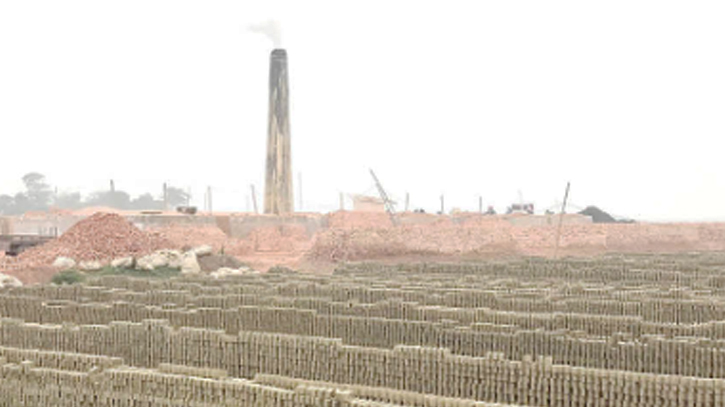
The use of low-quality coal in these kilns in Brahmanbaria has resulted in air pollution, emitting smoke that not only harms crops but also poses a significant threat to the environment and biodiversity. Photo: Messenger
An alarming 96 out of 176 brick kilns in Brahmanbaria district are operating illegally, posing a significant threat to the environment.
These unauthorized operations not only violate environmental regulations but also endanger agricultural lands, markets, and educational institutions.
The use of low-quality coal in these kilns has resulted in air pollution, emitting smoke that not only harms crops but also poses a significant threat to the environment and biodiversity.
The Brick Making and Installation of Kilns (Control) Act stipulates specific guidelines for obtaining soil for brick kilns, but recent years have seen the topsoil of agricultural land being excavated for brick production, particularly in Nabinagar, Sarail, and Vijaynagar upazilas. The allure of financial gain has led farmers to sell their land's topsoil to kiln owners and brokers, leading to declining fertility in croplands.
Of the 176 brick kilns, 96 have been deemed illegal by the Brahmanbaria Environment Department, with six kiln owners contesting the department's ruling. The Department of Environment identifies kilns as illegal due to a variety of reasons, such as the absence of permissions from relevant authorities, unauthorized locations, and improper brick-burning methods.
Furthermore, almost half of the illegal brick kilns remain operational, with many situated in close proximity to agricultural lands, markets, and settlements. The illegal extraction of soil for brick production has led to concerns about the diminishing agricultural output and its impact on the region's environment.
Local brick kiln proprietors, such as Babul Mia of Digital Bricks, acknowledge the need for adherence to the law but also express concerns about the potential scarcity of bricks if regulations are strictly enforced. The president of the Brahmanbaria Chamber of Commerce and Industry, Azizul Haque, highlights the challenges of closing down brick kilns that were established before the emergence of nearby human settlements and schools, emphasizing the need for a gradual transition to alternative construction materials.
Leaders of environmental and biodiversity organizations have criticized the lack of effective measures by the district administration and environmental department in curbing the operation of unauthorized brick kilns. They allege that brick kiln owners influence the administration by spending considerable sums of money, enabling them to continue their operations despite the environmental and legal violations.
Shamim Ahmed, President of Tari Bangladesh organization, warns that the unchecked growth of illegal brick kilns is jeopardizing the environment and calls for proactive measures by the administration. Despite fines and environmental laws, the brick kilns continue to operate, raising concerns about the administration's indifference.
Deputy Director of Brahmanbaria Environment Department, Khaled Hasan, acknowledges the challenges but asserts that regular operations against illegal brick kilns are ongoing. Last year alone, fines totaling Tk 16 lakh were imposed during raids, leading to the closure of some brick kilns. The department plans to launch another drive against illegal brick kilns shortly.
Efforts to address this issue will be reinvigorated, with plans for renewed inspections and crackdowns on illegal brick kilns, reflecting the ongoing commitment to enforce environmental regulations and safeguard the region's well-being.
Messenger/Fameema








